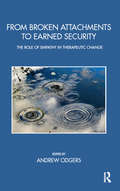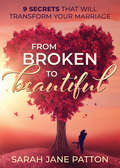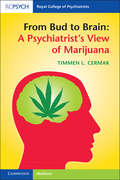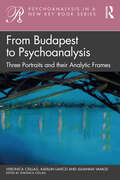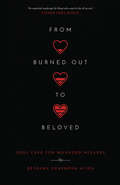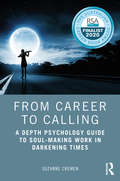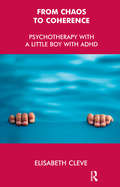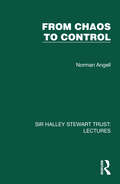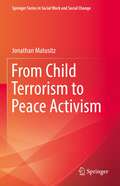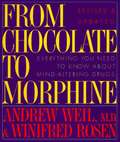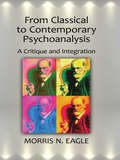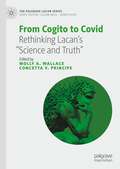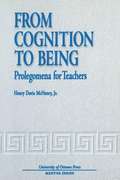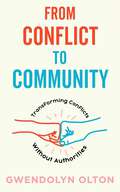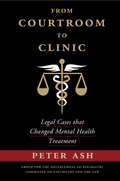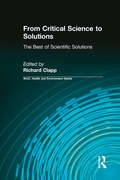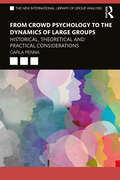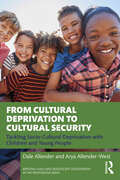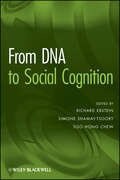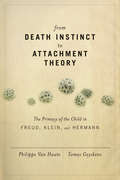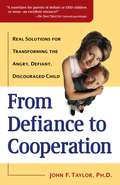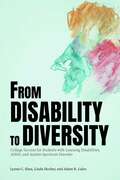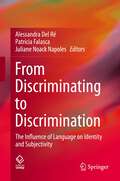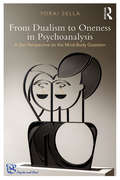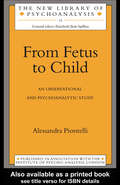- Table View
- List View
From Broken Attachments to Earned Security: The Role of Empathy in Therapeutic Change (The Bowlby Centre Monograph Series)
by Andrew OdgersThe 2011 John Bowlby Memorial Conference, 'From Broken Attachments to Earned Security - The Role of Empathy in Therapeutic Change', focused on what needs to take place to facilitate empathy and attunement and ultimately the achievement of earned security. The confernce posed the challenge of how to re-establish a secure sense of self, mutuality, and the capacity for inter/intra-subjectivity when difficulties in empathy and attunement exist as a result of relational trauma. This can be between parent and child, within adult relationships, between client and therapist, or in organisational contexts. The outstanding collection of papers in this volume make a significant contribution to the field of attachment and our understanding of how child rearing affects each aspect of our lives, from the interpersonal to the organisational and societal. Each paper moves beyond the academic and theoretical to provide answers to the many difficult questions raised at the conference.
From Broken to Beautiful: 9 Secrets That Will Transform Your Marriage
by Sarah Jane PattonA step-by-step journey to help you discover your truth, let go of fear, and dig you and your spouse out of the deepest of relationship ruts.From Broken to Beautiful shows women how to adjust their communication with their husbands in order for them to have the relationship they truly desire. It walks women through Sarah Jane Patton’s real-life triumphs and tribulations that led her to healing and happiness. After reading From Broken to Beautiful, women and their husbands will:Talk again every day with ease, like they used toGo on dates and fall in love all over againHelp each other understand one another’s feelings without arguingSave their marriage from ending in divorce
From Bud to Brain: A Psychiatrist's View of Marijuana
by Timmen L. CermakThe trend toward liberalizing medical and recreational marijuana use is increasing the obligation on clinicians to provide useful information to the public. This book summarizes the science all healthcare professionals need to know in order to provide objective and relevant information to a variety of patients, from recreational and medicinal users to those who use regularly, and to adolescents and worried parents. The author brings two and a half decades of studying cannabinoid research, and over forty years' experience in psychiatric and addiction medicine practice, to shed light on the interaction between marijuana and the brain. Topics range from how marijuana produces pleasurable sensations, relaxation and novelty (the 'high'), to emerging medical uses, effects of regular use, addiction, and policy. Principles of motivational interviewing are outlined to help clinicians engage patients in meaningful, non-judgmental conversations about their experiences with marijuana. An invaluable guide for physicians, nurses, psychologists, therapists, and counsellors.
From Budapest to Psychoanalysis: Three Portraits and their Analytic Frames (Psychoanalysis in a New Key Book Series)
by Veronica Csillag Katalin Lanczi Julianna VamosThis book follows the personal and professional journeys of three Jewish women from Budapest, originally classmates in the same high school. The book shows how they and their families were marked by the Shoah, and explores the impact of the social, cultural, and political milieu in which they travelled upon their development as psychoanalysts. Following an introduction by the Hungarian psychoanalyst, Judit Mészáros, who gives a broad historical review of Hungarian Jewry during the Shoah and the Soviet era, the three authors provide autobiographical accounts of their own psychoanalytic evolution and interconnectedness. They describe their motivations for emigrating from Hungary, their early struggles to fit in, and their eventual acculturation. The authors explore their coming of age as clinicians in their adopted homelands and explain how their theoretical orientation and clinical styles were shaped by their respective analytic environments, their training experiences, and their own personal histories. They offer clinical vignettes to illustrate their respective psychoanalytic perspective. The book closes with an afterword from American psychoanalyst, Adrienne Harris, who contemplates the authors’ immigration experiences alongside her own. Replete with personal, cultural, and political history, this book will prove both informative and fascinating for psychoanalysts, psychotherapists as well as the general public.
From Burned Out to Beloved: Soul Care for Wounded Healers
by Bethany Dearborn HiserAs a social worker, jail chaplain, and justice advocate, Bethany Dearborn Hiser pushed herself to the brink of burnout—and then kept going. Stress, despair, and compassion fatigue overwhelmed her ability to function. She was called to serve the abused, addicted, and homeless people in her community. Yet she was emotionally and spiritually exhausted. Something needed to change. Searching for answers, Hiser learned that trauma affects everyone who is exposed to it—not only those experiencing it firsthand. Psychologists call it "secondary trauma." She realized that she needed the very soul care that she was providing to others. From Burned Out to Beloved is Hiser's story of burnout, self-discovery, and spiritual renewal. But more than that, it's a trauma-informed soul care guide for all Christians working in high-stress, helping professions. Whether you're a social worker, therapist, pastor, teacher, or healthcare professional, From Burned Out to Beloved will equip you to confess your limitations, embrace your identity as a beloved child of God, and flourish in your vocation.
From Career to Calling: A Depth Psychology Guide to Soul-Making Work in Darkening Times
by Suzanne CremenFinding and following an authentic calling challenges us to bridge both the intuitive, soulful and the hard-edged, material dimensions of everyday life. From Career to Calling: A Depth Psychology Guide to Soul-Making Work in Darkening Times opens new avenues for vocational exploration and career inquiry in an imaginative way. This unique book draws on insights from the field of Jungian and archetypal psychology to reimagine our attitudes and approaches to work, money, vocational guidance and career development. As people find themselves disillusioned with or disenfranchised from capitalist notions of work and career, Suzanne Cremen’s interdisciplinary approach illuminates how a creative, meaningful and influential work-life can emerge from attending to the archetypal basis of experience. Interweaving elements of her own journey, Cremen connects individual experience with the collective in an original way, spotlighting depression in the legal profession, marginalization of the feminine principle in work environments, and how understanding the roots of our cultural complexes can spark personal callings which facilitate collective transformation. Blending compelling real-life stories with robust scholarly analysis and reflective activities, this book will help practitioners to support individuals to develop a sense of their soul’s calling and offer guidance on creating an authentic vocational life within the constraints of the contemporary era. Additionally, it will be invaluable to those in career transition, re-discovering their purpose at the end of a career, or commencing work-life.
From Chaos to Coherence: Psychotherapy with a Little Boy with ADHD
by Elisabeth Cleve'... I am flooded with warmth for this little expert on the art of living, who has just realised that even he has the possibility to live a long life. My interpretation is that he trusts he will get the time he needs in therapy to reach, first adulthood, and, then, old age. Right now he believes he will continue to be in therapy for the rest of his life. He cannot imagine that it is going to come to an end. However, I have started to think about when we will have to part and I am not looking forward to it...'
From Chaos to Control (Sir Halley Stewart Trust: Lectures)
by Norman AngellOriginally published in 1933, this volume From Chaos to Control represents the expansion of notes used in the delivery of the Halley Stewart Lectures for 1932–1933. Following on from the economic lecture of the previous year, this title covers “the psychology of popular understanding, of the nature of the public mind in relation to the technical problems discussed by last year’s lecturers; a problem of education, of politics.”This book is a re-issue originally published in 1933. The language used and views portrayed are a reflection of its era and no offence is meant by the Publishers to any reader by this re-publication.
From Child Terrorism to Peace Activism (Springer Series in Social Work and Social Change)
by Jonathan MatusitzThis book examines the reasons for which children join terrorist movements and how they eventually become peace activists fighting the very crimes that they once committed. The transformation of child terrorists into peace activists has received scant attention from academics and practitioners alike. Particular focus is placed on child jihadism, child terrorism in Africa and Latin America, child separatist terrorism, and White child supremacism. These five groups of child terrorists represent about 80% of the problem across the world. The text serves as a primer for anti-terrorism and peace activism for global social change. It includes original, applied research and features personal accounts from former child terrorists who became peace activists themselves. One of the nine chapters provides an in-depth thematic analysis of the lives of 24 subjects (from all five aforementioned groups). The analysis produced four main themes that encapsulate the time and effort that it takes to become a peace activist today: metamorphosis, terrorist behavior, disillusionment, and anti-terrorist behavior. The book ends with multiple solutions from the perspective of social work, including the reintegration of former child terrorists into society.From Child Terrorism to Peace Activism is a resource of deep and broad appeal. The text is essential reading for upper-level undergraduate and Master’s students in political science, military studies, international relations, international law, and peace and conflict studies. It can be pertinent reading for students and instructors in international social work contemplating social work-related solutions to rehabilitate former child terrorists and child soldiers into society through peace activism, anti-terrorist endeavors, and other socio-psychological methods that will produce social change. The text also would appeal to faculty and students in childhood studies with an interest in child terrorism, child development, and child trauma and resilience. Given the essentials, depth, and possibilities that the book offers, it is a useful resource for audiences within counterterrorism institutes, national security agencies, and academic think-tanks. Information on motives, strategies, radicalization processes, and recruitment methods used by terrorist organizations as well as their effects on various audiences will draw readers from law enforcement agencies and institutions.
From Chocolate to Morphine: Everything You Need to Know About Mind-Altering Drugs (Revised and Updated)
by Andrew Weil Winifred RosenFrom coffee to marijuana to smart drugs, Dr. Weil's definitive guide to legal and illegal drugs - revised and updated for the 1990's. The authors insist that readers learn to distinguish drug use from drug abuse. As long as society continues to call all those who take disapproved substances "drug abusers," it will have an insoluble problem of enormous proportions. Real drug abusers are those in bad relationships with drugs,* whether the drugs are approved or disapproved by society, and unfortunately little can be done to help them, unless they want to change. Preventing drug abuse is a realistic goal. Two approaches are possible. One is to teach people, especially young people, how to satisfy their needs and desires without recourse to drugs. The second is to teach people how to form good relationships with drugs so that if they choose to use drugs, they will continue to be users and never become abusers.
From Classical to Contemporary Psychoanalysis: A Critique and Integration (Psychological Issues)
by Morris N. EagleThe landscape of psychoanalysis has changed, at times dramatically, in the hundred or so years since Freud first began to think and write about it. Freudian theory and concepts have risen, fallen, evolved, mutated, and otherwise reworked themselves in the hands and minds of analysts the world over, leaving us with a theoretically pluralistic (yet threateningly multifarious) diffusion of psychoanalytic viewpoints. To help make sense of it all, Morris Eagle sets out to critically reevaluate fundamental psychoanalytic concepts of theory and practice in a topical manner. Beginning at the beginning, he reintroduces Freud's ideas in chapters on the mind, object relations, psychopathology, and treatment; he then approaches the same topics in terms of more contemporary psychoanalytic schools. In each chapter, however, there is an underlying emphasis on identification and integration of converging themes, which is reemphasized in the final chapter. Relevant empirical research findings are used throughout, thus basic concepts - such as repression - are reexamined in the light of more contemporary developments.
From Cogito to Covid: Rethinking Lacan’s “Science and Truth” (The Palgrave Lacan Series)
by Concetta V. Principe Molly A. WallaceThis edited collection examines the contemporary relevance of Lacan’s 1965 essay “Science and Truth” to debates on science, psychoanalysis, ethics and truth. In doing so, it re-considers the established understanding of its argument that psychoanalysis is the only science for the human subject. Over fifty years after Lacan attempted to formalize the relationship between science and psychoanalysis in “Science and Truth,” this volume returns to the categorically systematic yet deeply puzzling ideas of this lecture-turned-essay. The volume begins with a rigorous analysis of the formal logic animating the cogito, which serves as a foundation for the remainder of the book to force a confrontation between the themes laid out in “Science and Truth” and the cultural, intellectual, political, economic, and, of course, scientific movements that we face today. The following five chapters examine various contemporary phenomena, including the destabilizing forces of post-truthism and political nihilism, the ‘non-science’ of filmic depictions of science, the prosopopeia of Lacan’s so-called secular Name of the Father, the pseudoscientific discourse of involuntary celibates, or ‘incels,’ and, finally, the alliance between science and capitalism that has developed out of the Covid-19 pandemic. This project offers an important contribution to contemporary debates about science and ethics that will be of interest to academics working in psychoanalytic and critical theory, and the philosophy and history of science; as well as to clinicians.
From Cognition to Being: Prolegomena for Teachers
by Henry Davis Mchenry Jr.Teachers must constantly invent and re-invent ways of being together with their students to enable both a shared mastery and a shared apprenticeship.
From Conflict to Community: Transforming Conflicts Without Authorities
by Gwendolyn OltonConflict is everywhere: our living rooms, our streets, our community organizations, and every corner of the internet. But few of us have the training to successfully intervene or resolve these conflicts. In these pages, experienced peacemaker Gwendolyn Olton shows you how to use your existing skills and intuition to transform a wide variety of conflicts from insurmountable impasses to working relationships where everyone's needs are met. The result is a practical, kind, realistic guidebook for anyone who's found themselves in a conflict (their own or someone else's) and wondered, "How did we get here and what can I do to make it better!?"The book is broken up into three sections: learn the basics of conflicts, help others work out their conflicts, and finally, resolve and heal the conflicts in your own life. Filled with real life examples and thought-provoking scenarios, Olton offers a variety of conflict analysis and conversation tools that you can use to navigate the most challenging interpersonal dynamics, and to better understand yourself and others along the way—all without calling HR or the cops.
From Courtroom to Clinic: Legal Cases that Changed Mental Health Treatment
by Peter AshWhy do present-day mental health professionals practice the way that they do? Over the past fifty years, a number of landmark court holdings have changed such basic principles as what material is confidential, how civil commitment and involuntary treatment are conducted, and when a therapist has a duty to protect the public from a dangerous patient. Unlike most legal texts, this volume explores these complex principles through the human stories of the litigants involved.
From Critical Science to Solutions: The Best of Scientific Solutions (Work, Health and Environment Series)
by Richard ClappFirst Published in 2017. Routledge is an imprint of Taylor & Francis, an Informa company.
From Crowd Psychology to the Dynamics of Large Groups: Historical, Theoretical and Practical Considerations (The New International Library of Group Analysis)
by Carla PennaFrom Crowd Psychology to the Dynamics of Large Groups offers transdisciplinary research on the history of the study of social formations, ranging from nineteenth-century crowd psychology in France and twentieth-century Freudian mass psychology, including the developments in critical theory, to the study of the psychodynamics of contemporary large groups. Carla Penna presents a unique combination of sociology, psychoanalysis, and group analysis in the study of social formations. This book revisits the epistemological basis of group analysis by introducing and discussing its historical path, especially in connection with the study of large groups and investigations of the social unconscious in persons, groups, and societies. It also explores early work on group relations and contemporary research on the basic-assumption group in England, particularly Hopper’s theory of Incohesion as a fourth basic assumption. From Crowd Psychology to the Dynamics of Large Groups enables the reader to map out the field of the unconscious life of crowds illuminating the darkness of twenty-first century collective movements. The reflections in this book present new perspectives for psychologists, psychoanalysts, group analysts, sociologists, and historians to investigate the psychodynamics of contemporary crowds, masses, and social systems.
From Cultural Deprivation to Cultural Security: Tackling Socio-Cultural Deprivation with Children and Young People (Applying Child and Adolescent Development in the Professions Series)
by Dale Allender Arya Allender-WestThis important book considers how youth of color and other marginalized youth experience socio-cultural deprivation from the repetition of traumatic socio-historic experiences as well as from the institutions they interact with such as schools, mental health organizations, and social services agencies. Focusing on the importance of connection to cultural heritage, the book shows how young people’s cognitive development can be mediated in educational settings through humanizing and culturally sustaining rituals that build rapport and facilitate learning and healing.The authors define socio-cultural deprivation and locate its origins for marginalized youth in post-traumatic slave syndrome, post-apocalyptic stress syndrome and similar socio-historic trauma, epigenetic trauma, and contemporary trauma. They weave theory and research, autobiography, and professional anecdotes to identify and elaborate upon socio-cultural deprivation and to provide rituals for rapport-building that can be applied to classrooms, group counselling, social work practices, and other human-centred work. Rituals include those acknowledging indigeneity; exploring personal ancestry and alternative forms for those who have no connection to their biological family; healing experiences through yoga, meditation, progressive relaxation, and visualization practices; and explicit relationship-building activities.From Cultural Deprivation to Cultural Security will be a crucial text for training and practising psychologists, educators, social workers, youth workers and counsellors, concerned with the positive development of children, adolescents, and young adults.
From DNA to Social Cognition
by Richard Ebstein Soo Hong Chew Simone Shamay-TsooryDecision-making is an integral part of our daily lives. Researchers seek a complete understanding of the decision-making process, including the biological and social basis and the impact of our decisions. From DNA to Social Cognition fills a gap in the literature that brings together the methods, perspectives, and knowledge of the geneticists, neuroscientists, economists, and psychologists that are integral to this field of research. The editors' unique expertise ensures an integrated and complete compilation of materials that will prove useful to researchers and scientists interested in social cognition and decision-making.
From Death Instinct to Attachment Theory
by Tomas Geyskens Philippe Van HauteTwo leading psychoanalysts resolve the conflict between attachment theory and trauma theory.In From Death Instinct to Attachment Theory, Tomas Geyskens and Philippe Van Haute address a theoretical conflict at the heart of contemporary psychoanalysis. Analytic theory, especially the work of Melanie Klein, asserts the developmental primacy of infantile Hilflosigkeit and the trauma it inevitably inflicts; however, John Bowlby and other attachment theorists have shown that attachment to the mother is primary and instinctive—and not the result of traumatic helplessness.Geyskens and Van Haute resolve the apparent tension between the empirical fact of the primacy of attachment and the fundamental psychoanalytic theory of infantile trauma by drawing on Imre Hermann&’s distinction between natural development and subjective history. Arguing that Hermann&’s theory constitutes a workable clinical anthropology of attachment, they undertake a deep and revealing analysis of the work of Freud and Klein on the death instinct, trauma, and infantile sexuality; the critique leveled by attachment theorists like Bowlby; and the overlooked insights of the Hungarian School of Psychoanalysis.From Death Instinct to Attachment Theory offers an elegant answer to an important problem in psychoanalysis and provides new insight into the sort of clinical phenomena that led Freud to move beyond the pleasure principle in the first place.
From Defiance to Cooperation: Real Solutions for Transforming the Angry, Defiant, Discouraged Child
by John F. TaylorChange Your Child's Life! Turn Negative Behavior into Positive TraitsHow do you deal with a difficult and defiant child or teenager? What can you do if your child has been diagnosed with oppositional defiant disorder (ODD) or is resentful and constantly in trouble at school? Are there constructive ways to channel such oppositional energy and determination? Dr. John F. Taylor will tell you how. Inside, you'll find new hope and hundreds of specific, sensible, and easy-to-implement suggestions for improving life with a rebellious and argumentative child. Parents and teachers -- anyone who deals with difficult children, teens, or young adults -- will also learn how to tap the potential of these natural-born leaders by discovering how to: ·Understand why an oppositional attitude exists ·Open up new, safer avenues for children to express needs and wants ·Enhance communication, avoid common mistakes, and reduce undesirable behavior ·Teach a child conscience-based self-control ·And much more!From the Trade Paperback edition.
From Disability To Diversity: College Success For Students With Learning Disabilities, Adhd, And Autism Spectrum Disorder
by Lynne C. Shea Linda Hecker Adam R. LalorColleges and universities are seeing increasing numbers of students with a range of disabilities enrolling in postsecondary education. Many of these disabilities are invisible and, despite their potential for negative impact on students’ academic and social adjustment, some students will choose not to identify as having a disability or request support. Approaching disability from the perspective of difference, the authors of this new volume offer guidance on creating more inclusive learning environments on campus so that all students―whether or not they have a recognized disability―have the opportunity to succeed. Strategies for supporting students with specific learning disabilities, attention-deficit/hyperactivity disorder, autism spectrum disorder or who display learning and behavioral characteristics associated with these profiles are described. A valuable resource for instructors, advisors, academic support personnel, and others who work directly with college students.
From Discriminating to Discrimination: The Influence of Language on Identity and Subjectivity
by Juliane Noack Napoles Alessandra Del Ré Patrícia FalascaThis book adopts a multidisciplinary approach to try to answer the question of how do we, as human beings, go from the socially neutral linguistic act of discriminating external stimuli to the socially loaded act of promoting social discrimination though language? This contributed volume brings together works presented at the international event “From Discriminating to Discrimination – The Influence of Language on Identity and Subjectivity”. This was an online event hosted and organized by the Brandenburg University of Technology (BTU), Germany, in partnership with São Paulo State University (UNESP), Brazil, that brought together lecturers from different universities around the world. During the event, linguists, psychologists, language teachers, social workers and pedagogues got together to discuss how discriminating can be recognized as a natural and important ability of the human being in the early stages of life and, after that, how to avoid discriminatory acts against others. The debates held online took into account the important and necessary dialogue between linguistics and other social sciences to discuss the role played by language as a form of building subjectivity and teaching practices that can contribute to minimize discrimination and promote integration and acceptance in a broad sense, understanding the preponderant role of language in recognizing what is different (discriminating), without diminishing or excluding it (discrimination). From Discriminating to Discrimination: The Influence of Language on Identity and Subjectivity will help linguists, psychologists, educators, social workers and a broad range of social scientists working with cognitive, linguistic and educational studies understand the path taken by differentiation, from the beginning of the child's language development – when discrimination (of sounds, gestures, etc.) is essential for the acquisition of language to occur –, until the moment when differentiation, discrimination, ceases to be an essential factor and becomes a means of social segregation.
From Dualism to Oneness in Psychoanalysis: A Zen Perspective on the Mind-Body Question (Psyche and Soul)
by Yorai SellaFrom Dualism to Oneness in Psychoanalysis: A Zen Perspective on the Mind-Body Question focuses on the shift in psychoanalytic thought, from a view of mind-body dualism to a contemporary non-dualistic perspective. Exploring this paradigm shift, Yorai Sella examines the impact of the work of psychoanalysts and researchers, such as Winnicott, Bion, Daniel Stern and Kohut, and delineates the contributions of three major schools of psychoanalytic thought in which the non-dualistic view is exemplified: (1) intersubjective; (2) neuro-psychoanalytic; and (3) mystically inclined psychoanalysis. Reaching beyond the constraints of dualism, Sella delineates the interdisciplinary approaches leading to psychoanalysis's paradigm shift. Focusing on the unique contribution of Zen-Buddhism, the book draws on Ehei Dōgen's philosophy to substantiate the non-duality of subject and object, body and mind - ultimately leading from alienation and duality to what Bion has termed "at one-ment". The way in which psychoanalytic theory and practice may develop further along these lines is demonstrated throughout the book in a variety of clinical vignettes. This book will inform the practice of all psychoanalysts, mental health professionals, psychotherapists and clinicians interested in mind-body issues in psychotherapy, in the philosophy of psychoanalysis, and in East-West dialogue.
From Fetus to Child: An Observational and Psychoanalytic Study (The New Library of Psychoanalysis #No.15)
by Alessandra PiontelliThe use of ultrasonic scans in pregnancy makes it possible to observe the fetus undisturbed in the womb. Dr Alessandra Piontelli has done what no one has done before: she observed eleven fetuses (three singletons and four sets of twins) in the womb using ultrasound scans, and then observed their development at home from birth up to the age of four years. She includes a description of the psychoanalytic psychotherapy of one of the research children, and the psychoanalysis of five other very young children whose behaviour in analysis suggested that they were deeply preoccupied with their experience in the womb. Dr Piontelli has discovered what many parents have always thought - that each fetus, like each newborn baby, is a highly individual creature. By drawing on her experience as a child psychotherapist and psychoanalyst as well as on her observational research, she is able to investigate issues relating to individuality, psychological birth and the influence of maternal emotions during pregnancy. Her findings demonstrate clearly how psychoanalytical evidence enhances, deepens and supports observational data on the remarkable behavioural and psychological continuities between pre-natal and post-natal life.
